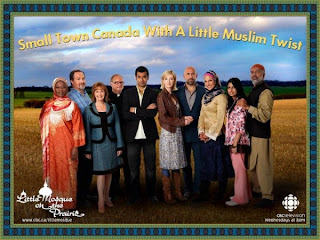The concept was radical in its non-radicalness: a television series about Muslims who were neither extremist nor oppressed.
Five years ago this January, the writer Zarqa Nawaz created something no one had seen before: a sitcom about ordinary Muslims living alongside non-Muslims in North America. They laughed. They cried. They got interrogated at airports.
As Little Mosque on the Prairie enters its sixth and final season today, the series remains the only one of its kind. Canadian in origin, it has gone on to be broadcast in more than 50 countries worldwide, from France to Finland to francophone Africa. It came to the UAE in 2008. Along the way, the show has won countless awards in Canada and abroad for its fresh portrayal of multiculturalism.
“It accomplished more than I ever thought it ever would – no one believed it could last six seasons,” Nawaz says. “A show about Muslims in the middle of the prairies was not what anyone was going to consider a ratings hit.”
The actress Sitara Hewitt, who plays Dr Rayyan Hamoudi, recalls the show had a humble start.
“We shot it in a little studio – it didn’t have a huge budget at the beginning. It was a bit of a pipe dream.”
Then, after the first episode was broadcast, Hewitt got a text message telling her more than two million viewers had tuned in that night. She was shocked.
The reviews were mixed – Little Mosque was hailed as groundbreaking, but dismissed as insipid. Viewership fell by more than a quarter. Nevertheless, the show was undeniably unique. Awards were rolled out, and new fans rolled in – including from the US, where the show wasn’t screened, but was accessed online.
It’s been a humbling experience, says the actor Zaib Shaikh, who plays the town imam, Amaar Rashid. When he took the role, his focus was on making a funny, believable show about diversity. The fact that it’s turned into something much bigger reminds him of another groundbreaking series: The Cosby Show.
“Bill Cosby wasn’t trying to make a show that showed African-Americans were normal,” Shaikh says. “He was trying to show African-Americans as themselves. As soon as you show a culture that’s been ignored or feared as itself, chances are you’re humanising it.”
The evidence of how badly Little Mosque on the Prairie was needed is in the audience’s reception, Hewitt says.
“The best pieces of fan mail are the ones from women saying, thank you so much for finally portraying someone like me on TV in a favourable light,” she says. “One of the Muslim girls called Rayyan the Muslim Carrie Bradshaw.”
An enduring storyline on the show has been the budding romance between Rayyan and Amaar, who wed at the end of season five. It’s been a Ross and Rachel tale – but with chaperoned dates, which have led to complications and hilarity.
The power of comedy, Nawaz says, is that it lets everyone’s guard down. That provides an opportunity for dialogue. Five years on, she still believes entertainment is one of the best ways to tackle the prejudice that is still all too common.
“[The show] is like a drop in an ocean of the anti-Muslim Islamophobia that exists,” she says. “I’m glad to have helped turn that tide, but it’s still a huge tide.”
The show is produced by the CBC, Canada’s public broadcaster, which has a mandate to reflect the country’s multiculturalism. Nawaz says it wasn’t hard to get the show on air – where she did run into creative differences was with storyline ideas.
Nawaz was originally the only Muslim writer on the show (she fought for a second one to be brought on in a later season), and just as the show’s Muslims and non-Muslims don’t always see eye to eye, neither did the team behind the scenes.
One storyline that never made it to screen was about Amaar’s virginity. Though Nawaz explained it would be normal for an unmarried man to be a virgin in Muslim culture, the network executives disagreed.
“They would say no, it’s not humanly possible,” Nawaz recalls. “It was always this weird resistance I would get, when they were trying to frame things in their perspective. It was hard – and that’s why I say it was a miracle that we got what we got out of the show.”
Right now, the closest television offering to Little Mosque is an American reality series that debuted in November, All-American Muslim. The two shows shared similar journeys. Both raised eyebrows before they were broadcast, as Muslims, non-Muslims, and the media alike questioned their motives. Once they debuted, both shows were found to be high-minded – if too benign to be highly entertaining.
But Little Mosque was never subjected to the right-wing boycott calls that recently besieged advertisers on All-American Muslim. Instead, Little Mosque had advertisers lining up for airtime. Its own controversy was decidedly more Canadian.
In 2010, diplomatic cables released by Wikileaks revealed that American officials in Ottawa had kept an eye on Little Mosque, and didn’t like what they saw. The cable warned Washington of Canadian television’s “negative popular stereotyping” of US border officials. The suspected cause? Canada’s inferiority complex.
The CBC’s decision to bring Little Mosque’s run to an end came as a disappointment to Nawaz, who says there’s still a lot of material in the Muslim community to work with – such as the issue of women and leadership in the mosque.
But Hewitt promises that the show will go out with a bang.
“It’s going to be a very satisfying finale, I think, for fans,” Hewitt says. “Every character that you may have seen and know and love, some big event is going to happen that affects all of their lives, and you’re going to find it very satisfying as a viewer – and a surprise, too.”

No comments:
Post a Comment